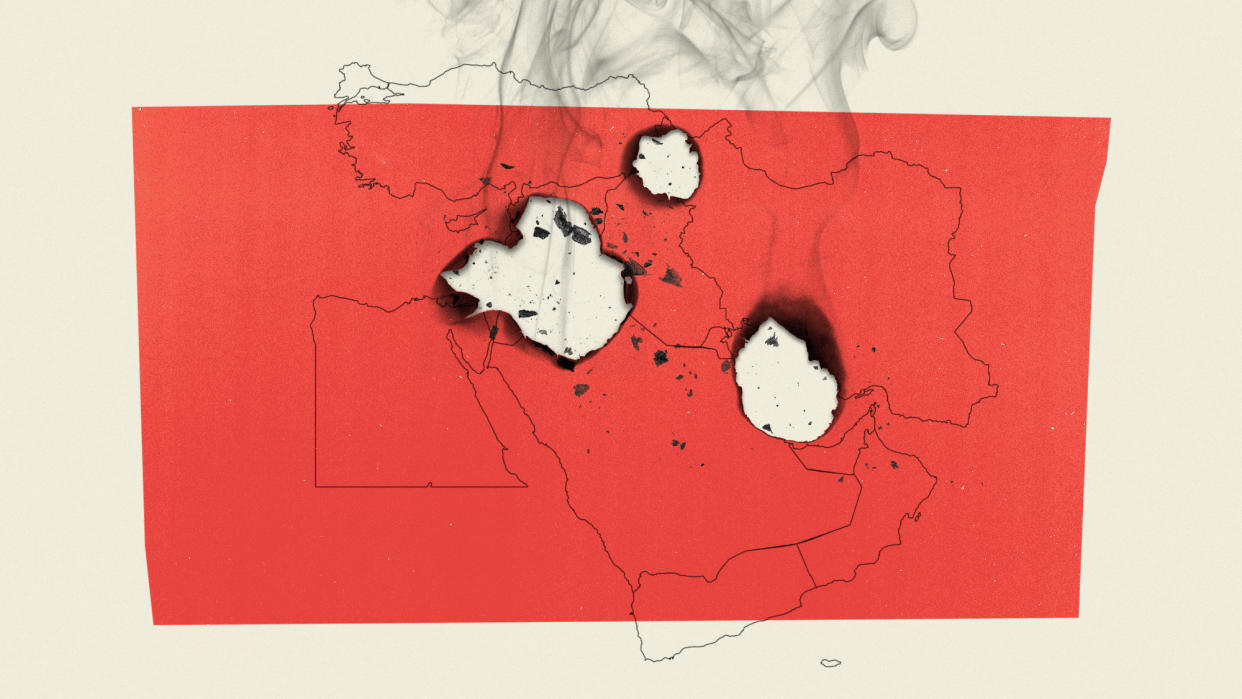Will the Israel-Hamas war trigger a wider Middle East conflict?

- Oops!Something went wrong.Please try again later.
- Oops!Something went wrong.Please try again later.
One danger of the war between Israel and Hamas: It could explode into a wider conflict across the Middle East. “The political aftershocks of the attack will reverberate far beyond the sliver of Mediterranean land where it began,” columnist Ned Temko wrote for The Christian Science Monitor. Across Israel’s border with Lebanon, the terror group Hezbollah reportedly might be preparing its own attack. Iran is threatening to wade in. The repercussions of Hamas’ attack on Israel are “unpredictable and difficult to contain.”
American leaders are making a “frantic effort” to head off a wider war, CNN reported, sending two aircraft carrier groups to the region even as Secretary of State Anthony Blinken hopscotches between countries in a furious round of shuttle diplomacy. “No one should do anything that could add fuel to the fire in any other place,” Blinken said this week. Still, the U.S. is also sending an amphibious task force toward Israel, just in case. And a new poll reports that 79% of Americans fear the clash may lead to a broader conflict.
“The inferno flaring out from Gaza is turning into a potential nightmare for the entire region,” The New York Times reported. Egypt, Iraq, Jordan and Lebanon all risk being drawn into the conflict. Those prospects are “frightening officials, scholars and ordinary people across the region.”
What the commentators said
“The risk of escalation is very real,” Afshon Ostovar, an associate professor at the Naval Postgraduate School, wrote for War on the Rocks, a foreign affairs blog. The possibility of a wider regional war is “uncomfortably close.” But Israel faces hard choices, given that Iran is a backer of Hamas. If Israel “truly seeks to end the threats aligned against it,” a confrontation with Iran may be in the cards. And that could lead to “a war with no obvious offramps or endpoints.”
Or maybe not. The Israel-Hamas war “won’t inevitably get bigger,” Kenneth M. Pollack wrote at Foreign Affairs. Iran and Hezbollah are “the only two candidates that could plausibly broaden the war,” and both have signaled that they’re not looking for a fight, issuing “vague threats” and lobbing a “handful of missiles” respectively. While “escalation is not out of the question,” it seems unlikely at the moment that the conflict will grow into “one that engulfs the entire region.”
But there is a danger the Israel-Hamas conflict could become a “real war,” Marc Champion argued for Bloomberg. That “real” war would pit Israel not just against a single well-armed terror group, but against “a range of state and non-state actors” from across the Middle East. Indeed, Hamas probably intended such an all-consuming battle. Israeli leader Benjamin Netanyahu must deliver retribution for the group’s murderous attack on Israel. But he must balance that with restraint and respect for civilian lives in Gaza. Otherwise, “this conflict could grow a lot worse if allowed.”
What next?
A key factor in all this: Whether Hezbollah decides to join the conflict. There have been some minor border clashes with Israel since Hamas attacked, Hanin Ghadda noted at Foreign Policy, but those actions amounted to a “limited escalation” while offering “plausible deniability” that anything bigger is afoot. What happens next may depend on the But Hezbollah hasn’t called reserve forces to the border, though there is a risk that even the group’s “limited response” could get out of control.
It seems clear, though, that the Hamas attack on Israel “has upended fundamental assumptions about the Middle East,” The Wall Street Journal reported. And it continues a trend for the United States: President Biden and his two predecessors, Barack Obama and Donald Trump, have all tried to disentangle America from the region and turn its attention to China. Biden’s backing of Israel means that plan is, once again, on pause. “It’s a re-engagement,” said Brian Katulis of the Middle East Institute. “It turns out that our partners in the region are still heavily dependent on the security umbrella that the U.S. continues to provide.” But there may be only so much the U.S. can do to head off a wider war and its consequences. Said one analyst: “I don’t think anyone is thinking about the day after right now.”

